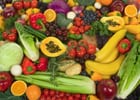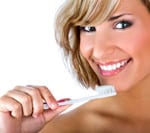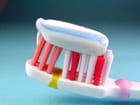 The foods you eat can actually have a big impact on how your mouth looks and feels. Our mouths convert sugar into acid, which then attacks our tooth enamel and this can lead to mean old tooth decay. Whenever we eat, we expose our teeth to the possibility of decay, but of course we need to eat to fuel our bodies! There are some delicious foods that are good for your teeth, so you can still enjoy your grub without compromising your teeth.
The foods you eat can actually have a big impact on how your mouth looks and feels. Our mouths convert sugar into acid, which then attacks our tooth enamel and this can lead to mean old tooth decay. Whenever we eat, we expose our teeth to the possibility of decay, but of course we need to eat to fuel our bodies! There are some delicious foods that are good for your teeth, so you can still enjoy your grub without compromising your teeth.
Tooth-friendly treats
Calcium is a big enamel-protector and you can find it in meats (especially chicken), cheese, milk and nuts. Crisp fruits and vegetables like apples and carrots are good for your teeth because they’re full of water, so their natural sugars aren’t as harmful. These crunchy delights also help your mouth to produce saliva, which helps to keep tooth decay at bay by washing cheeky bits of food debris from your teeth. Acidic citrus fruits are good for you, but make sure you eat them as part of a meal with other healthy foods, because their high acid content can be harmful to your teeth.
Drinks-wise, milk and water are your teeth’s best friends.
Enamel enemies
And now for the baddies. Hard sweets like lollipops and other sugary sinners like cakes and biscuits are not so good for our teeth. As well as being packed with sugar, these foods can be sticky and make a good breeding ground for bad bacteria. Be careful with cough sweets too!
When it comes to drinks, try and avoid sugary, fizzy drinks, coffee and sweetened tea. Sipping sugary drinks throughout the day is a recipe for disaster because that will just expose your teeth to potential damage all day long. Coffee and red wine can stain your teeth, so you might want to watch out there too.












